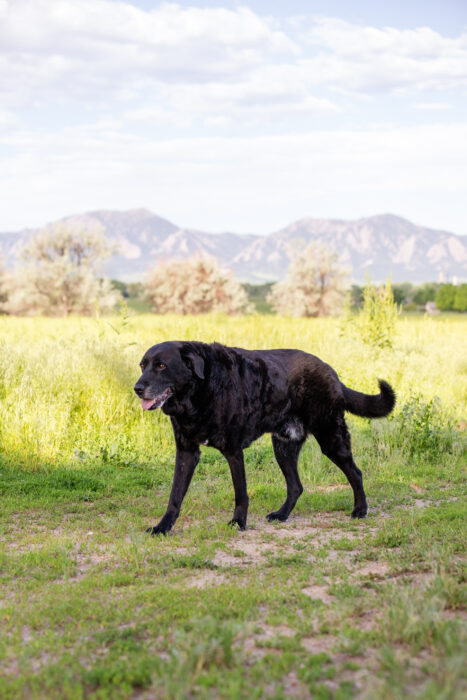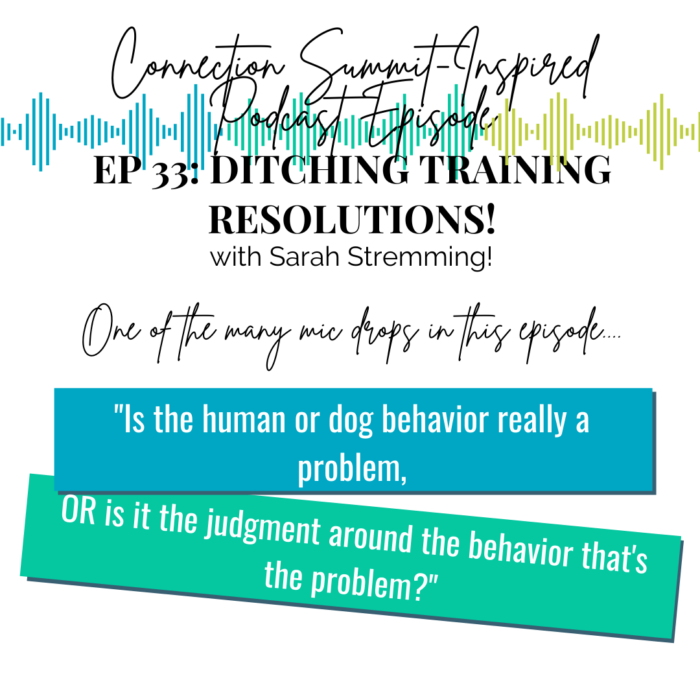In episode 33 of the Paws & Reward Podcast, I chat with my friend and colleague, Sarah Stremming of Cog-Dog Radio about why you should ditch your dog training resolutions. Wait – what?!?! Isn’t this a dog training podcast? Hear us out! We definitely want to encourage you to train with your dog(s). And, we also want to help you alleviate some of the pressure that a “new year, new you” attitude brings. In this episode, we talk about why resolutions quickly fail and what to do instead!
You can watch our conversation on my YouTube Channel.
Resolution is defined as a firm decision to do or not do something. As a dog owner, that can look like making the decision to go on more walks, to finally teach your dog to be tolerant of nail clippings, or to make time for enrichment activities. It’s important for us to recognize what drives us to make these dog training resolutions. Sometimes it can disregard the fact that a certain behavior (the one we might be avoiding) does serve a function.
How should I make a dog training resolution?
1. What is the behavior you would like to change or increase?
I want to work on my dog’s recall (come when called). I would like to increase my training sessions.
2. What need does this behavior fulfill? In other words, what function does it serve?
I avoid the training sessions for fear of screening up this behavior even more. So the avoidance keeps me safe AND stuck.
3. Under what conditions does this behavior occur?
The avoidance occurs when we go on trails. I don’t feel comfortable letting him off-leash, therefore, we have a restricted hike together.
4. Why is this behavior a problem? Is it bad for your health (or your dog’s health) or dangerous? Does the behavior actually need to be replaced or changed? Is it only a problem because of our shame or guilt surrounding it?
If I increased my training sessions and worked on improving his recall, I think he would have more freedom on his outings, which would meet his needs more efficiently.
“Behavior change is complex, both for humans and dogs. It’s more complicated than simply making a resolution, which is why they often fail.”

Is this behavior really problematic or is the judgement around it the problem?
If you decide that you do want to create dog training resolutions for the new year, you must find a solution that realistically fits into your life and still fulfills that original need. In the example above, the need is to feel competent and safe so a few solutions would be to:
- Practice in easy areas to start and reward your dog generously when they come to you.
- Slowly build criteria (distance, distraction, location).
- Use a long line to increase distance while maintaining safety.
- Consult a trainer for positive reinforcement advice.
Are your dog training resolutions feasible or worth the effort? If the answer is yes, start with small changes and find immediate reinforcement for the new behavior. Long-term benefits are not reinforcing enough to sustain immediate behavior change.
Remember, when making these changes, the old behavior was there for a reason and some days it will be harder to do the new behavior and that’s okay.
“Progress is never linear or perfect.”
Progress is small changes over time until the new pattern becomes easier than the old one.
Links:
- Find Sarah Stremming at The Cognitive Canine
- Check out The Connection Summit, a movement Sarah Stremming and I co-created to priotize the human-canine bond for successful behavior change.


